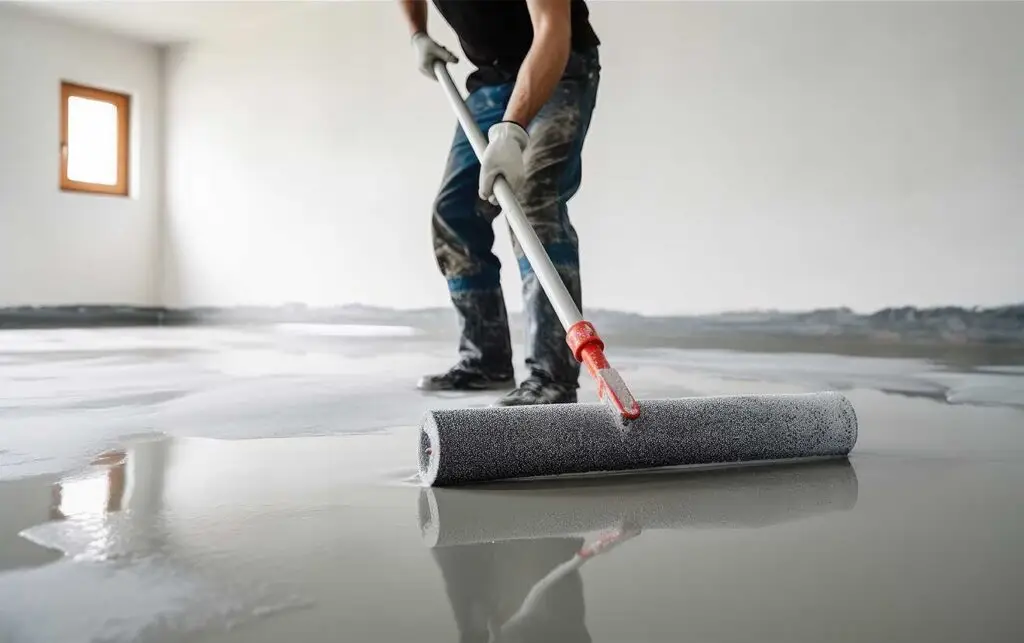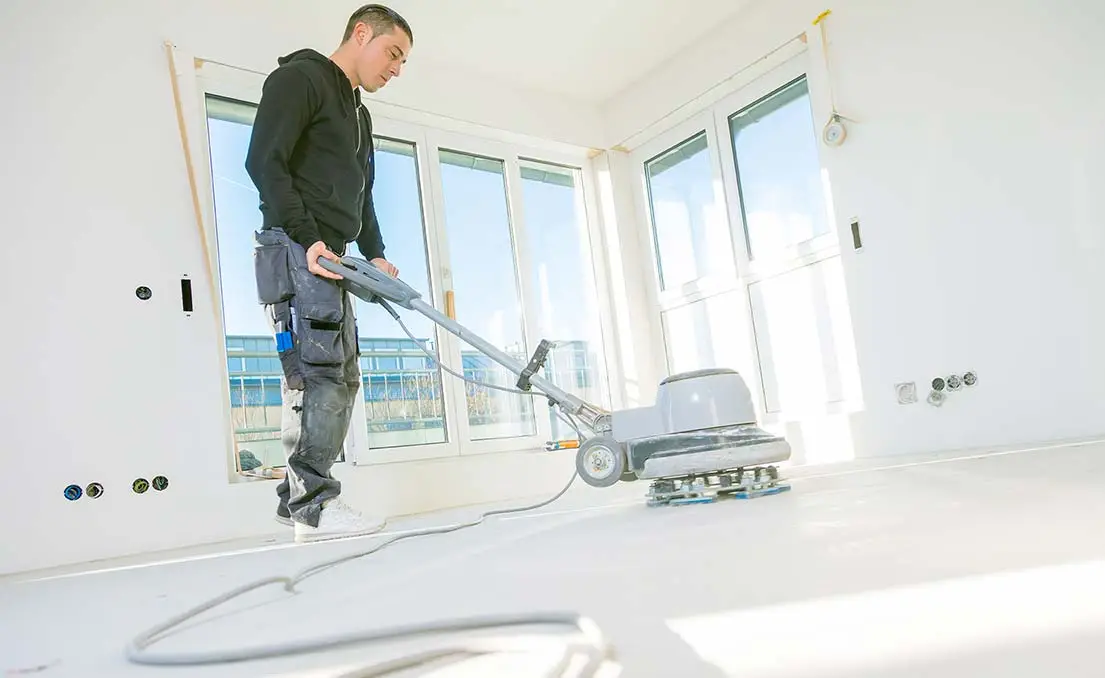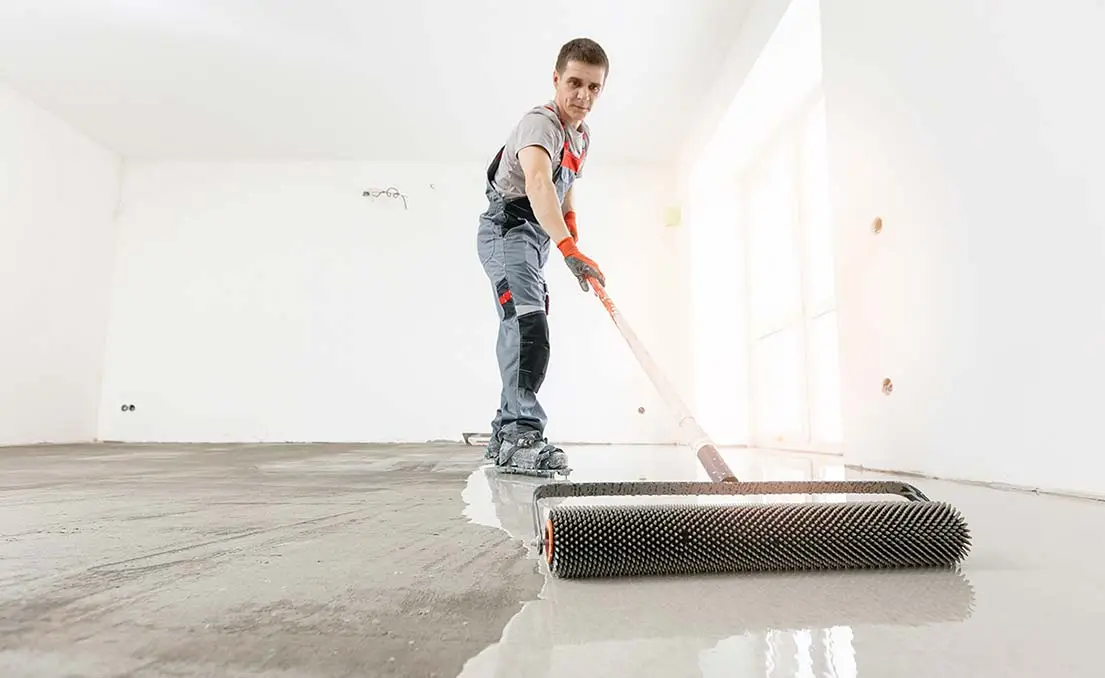
Epoxy garage floor coatings have gained popularity for their durability, aesthetic appeal, and resistance to stains and damage. If you’re considering upgrading your garage floor, understanding the epoxy garage floor cost is crucial to planning your budget.
This comprehensive guide will walk you through everything you need to know about the costs associated with epoxy garage floors, from factors affecting the price to potential long-term savings.
Understanding Epoxy Flooring and Its Benefits
Epoxy flooring stands out as a resilient and versatile option for garage floors, formed by combining a resin with a hardener to produce a tough, plastic-like surface. This concoction, once hardened, adheres robustly to its concrete base, providing an unparalleled level of strength and longevity.
One of its hallmark features is its high-gloss finish, which not only enhances the aesthetic appeal of your garage but also contributes to increased visibility by reflecting light more efficiently.
Beyond its visual advantages, epoxy flooring boasts a remarkable resistance to common garage contaminants, such as oil and water, making spills and stains easy to manage. Its seamless nature means cleaning is often straightforward, requiring little more than a mop or cloth.
Durability is another key benefit; epoxy floors are designed to withstand heavy traffic without succumbing to the usual wear and tear, including cracking and peeling, that can plague other floor types.
The personalization potential with epoxy is substantial, offering homeowners a chance to tailor their garage floors to their specific tastes. Whether you’re drawn to a solid color, prefer the elegance of a granite-look finish, or wish to explore metallic or even 3D effects, epoxy flooring can accommodate a wide array of design preferences.
This adaptability, combined with its functional merits, makes epoxy an attractive choice for those looking to upgrade their garage floors.
Factors That Affect Epoxy Garage Floor Cost
The price of installing an epoxy garage floor is influenced by several variables that homeowners should consider when budgeting for their project. Among these, the square footage of your garage is paramount; a larger area will inevitably increase both material and labor costs.
The current state of your garage floor also plays a significant role in determining the final cost. Floors with cracks, uneven surfaces, or moisture issues may require preparatory work such as leveling, crack filling, or even moisture barrier installation, which can add to the overall expense.
The choice of epoxy type and design complexity are additional factors that impact pricing. Basic, single-color epoxy applications are generally more cost-effective than elaborate, multi-colored, or specialty finishes like metallic or glitter epoxies. The thickness of the epoxy layer and any added decorative flakes or patterns also contribute to cost variations.
Geographical location cannot be overlooked, as labor costs differ markedly across different regions. Areas with a higher cost of living may see increased prices for professional installation services. Similarly, the local availability of materials can affect the total expense, with some regions having higher or lower prices based on supply chain factors.
By understanding these influencing factors, homeowners can better navigate the complexities of epoxy garage floor costs and plan their projects with a clearer financial perspective.
Average Cost of Epoxy Garage Floors
When exploring the expenses associated with epoxy garage floors, homeowners can anticipate spending between $3 to $12 for every square foot, a range that encompasses both the materials and labor required for the project.
Considering a typical two-car garage, which spans around 400 to 500 square feet, the total outlay could be anywhere from $1,200 to $6,000. It’s important to note that this estimation can vary greatly depending on specific factors such as the garage’s dimensions, the existing condition of the floor, and the chosen epoxy style and application complexity.
For those desiring custom designs or opting for premium epoxy variants, costs may escalate, pushing the upper limit of this range even higher. This variability underscores the importance of evaluating all contributing factors to gauge a more accurate financial commitment for your epoxy flooring project.
Keeping these considerations in mind will aid homeowners in preparing a budget that aligns with their expectations and the envisioned outcome for their garage space.
DIY vs. Professional Installation Costs
For those looking to economize on epoxy garage floor expenses, embarking on a DIY project can seem appealing. Available at most home improvement retailers, DIY epoxy floor kits range in price from $50 to $600, influenced by the kit’s quality and the coverage area.
While opting for a DIY approach can reduce initial expenses, the complexity of floor preparation and epoxy application should not be underestimated. Successful application requires meticulous attention to detail, and errors can lead to additional costs for correction.
Conversely, hiring professionals for epoxy floor installation might come with a higher price tag, yet it brings the assurance of expertise and quality. Experienced installers ensure thorough floor preparation, crucial for a lasting finish, and apply the epoxy smoothly to avoid common pitfalls like bubbles and uneven coating. This expertise not only guarantees a visually appealing and durable floor but can also prevent costly future repairs due to improper installation.
Ultimately, the decision between DIY and professional installation hinges on balancing the desire to save money upfront against the potential for higher costs and challenges. Homeowners should carefully assess their skills and the complexity of the project before deciding which route to take.
Long-Term Savings and Value
Investing in epoxy garage flooring transcends the upfront costs, unfolding into substantial savings over the years. Its robust nature means it resists the usual wear and degradation that floors are subjected to, significantly reducing the need for repairs or replacements.
The material’s resilience extends its lifespan, allowing it to serve homeowners for many years without the need for extensive upkeep. This endurance translates into fewer financial outlays for maintenance, making it a financially savvy choice in the long run.
Moreover, the aesthetic enhancement that an epoxy floor brings to a garage cannot be overstated. The polished, high-gloss finish not only revitalizes the space but can also play a role in bolstering the property’s market value. Prospective buyers often perceive such upgrades as a valuable addition, potentially making the property more attractive in the real estate market.
Additionally, the seamless and impervious surface of an epoxy floor makes it less hospitable to dust, mold, and other contaminants, contributing to a healthier environment. This aspect could further appeal to buyers looking for homes with clean, low-maintenance spaces.
In essence, the initial investment in epoxy flooring paves the way for enduring value, both in terms of reduced maintenance costs and the potential for increased home value, making it a prudent choice for the future.
Tips for Reducing Epoxy Garage Floor Costs
To lower the expenses associated with installing an epoxy garage floor, consider these practical strategies. Choosing a basic, single-color application over a more elaborate design can significantly cut down on costs, as specialty finishes and intricate patterns tend to drive up the price.
Additionally, taking on some of the prep work yourself can be a cost-effective move. Ensuring the garage floor is clean, free of debris, and adequately patched can save on professional preparation fees. However, it’s critical to familiarize yourself with the correct procedures to avoid making errors that could increase the project’s overall cost.
Another effective way to economize is by gathering and comparing quotes from several contractors. This can help you find the best value for the service, potentially uncovering lower-priced options without compromising on quality. Lastly, consider scheduling your project during slower business periods.
Contractors may offer discounts or be more willing to negotiate pricing during these times, providing an opportunity for additional savings. By employing these tactics, you can manage the investment in your epoxy garage floor project more efficiently, aligning it with your financial plan without sacrificing the final outcome’s quality and durability.
Conclusion
Navigating the costs associated with epoxy garage flooring requires careful consideration of several impactful factors, from your garage’s size to the specific epoxy design and application you choose.
Although the upfront cost may appear substantial, the exceptional durability, improved aesthetics, and the potential for increased property value position it as a valuable investment for the long haul. It’s imperative to weigh the initial financial commitment against the long-term advantages, including minimal maintenance requirements and the enduring appeal of your garage space.
By implementing cost-saving strategies such as choosing simpler designs or taking on preparatory work yourself, and by seeking multiple quotes for professional installation, you can manage your project in a financially savvy manner. Deciding whether to embark on a DIY project or to hire professionals comes down to a balance between upfront savings and the assurance of quality and longevity.
In making an informed choice that aligns with both your budget and expectations, you ensure that your garage floor upgrade is both cost-effective and transformative, enhancing the functionality and appearance of your space for years to come.

